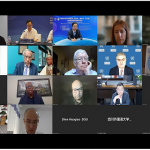These remarks were delivered by Ambassador Rajiv Bhatia, Distinguished Fellow, Gateway House at Session I of ‘BRICS Think Tank Symposium on BRICS Cooperation and Global Development: New Era, New Mission, New Plan’.
Dear Chair, Distinguished Panelists, and Participants,
It is a privilege to participate in this important symposium. As Distinguished Fellow at Gateway House, a prestigious think tank based in Mumbai and, as a member of the strategic community of India, may I commend the China Council for BRICS Think-Tank Cooperation, Sichuan International Studies University and other co-organizers for this timely initiative. It aims to provide our collective thoughts and suggestions to the Chinese presidency to help BRICS develop into a more effective organization that positively shapes the trajectory of world affairs, taking them on the path of peace, prosperity and cooperation.
Since this first session of the symposium focuses attention specifically on ‘BRICS and Global Development Governance’, I shall confine myself to articulating our considered views on this theme alone, while keeping in mind the achievements and challenges of BRICS since its creation 15 years ago.
Let me begin by stressing that the first imperative for us is to look within by adopting a realistic and candid approach to decipher the complex situation we find ourselves in. We meet today when the war in Ukraine is over two months old. One of the BRICS member-states is involved in it and has earned considerable opprobrium for its action. Further, the impasse in China-India talks on securing disengagement and de-escalation in certain areas in eastern Ladakh continues nearly two years after a clash that led to fatalities. And then there is the overarching impact of COVID-19 on humankind and the global economy, although the situation seems to be under better control than before. Member-states of BRICS need to craft suitable corrective measures to confront these challenges even as they push for improvement in global governance.
On the broad theme of global governance, I should offer a set of considered observations and suggestions, as below.
First, BRICS has been fully committed to effective and reformed multilateralism. Its elaborate vision was presented to the world through the New Delhi Declaration of XIII BRICS Summit in 2021 (in its paras 13–20). Like charity, reform should begin at home i.e., within the BRICS. When this institution began its journey, there was an ardent hope that Russia and China, the two permanent members of the UN Security Council, would find a way, in their own interest, to extend their full support to the candidature of the other three countries – India, South Africa, and Brazil. This has not happened. What is worse is that the BRICS formulation on this issue continues to be frozen and restricted to expressing only very feeble and general support. This must change. BRICS will stand strengthened on the day when Russia and China agree to offer clear and unreserved backing to their fellow BRICS members to become permanent members of the Security Council. It is a matter requiring serious reflection.
Second, despite sustained work by BRICS to advocate reform of the global financial governance through changes in the World Bank, IMF and WTO, only limited and modest progress has been achieved. It is not enough, but more gains are unlikely in the short term, given the steady reluctance of G7 to budge, combined with the geopolitical churn that is unfolding in Europe and the Indo-Pacific region today. There is a need for deep introspection by BRICS and the other segments of the international community on how to advance the agenda of global financial governance reform. BRICS needs to take unified but pragmatic positions in G20. The forthcoming Indian presidency of the G20 will be an apt occasion to pursue this goal, but serious work needs to begin now.
Third, the BRICS’ commitment to South-South Cooperation or the welfare of the Global South needs to be strengthened in practical terms. Adopting and projecting a common position does not end our responsibility. We should lead by example. The fact is that BRICS raised many expectations, but it has been unable to fulfil many of them. The expansion of the New Development Bank which now includes Bangladesh, UAE and Uruguay, should go further. Moreover, the five emerging economies should consider introducing a major expansion and diversification of their development cooperation with their respective neighbouring regions as well as the other less-developed parts of the South in Latin America, Africa, the Indian Ocean and the South Pacific region.
In this context, we may draw inspiration from the wise counsel of Ms. Ayanda Dlodlo, the then South African minister for public service and administration, who advised us in July 2018 “to position BRICS as the voice of the voiceless.” She went on to add aptly, “The BRICS countries should continue to position themselves as developing countries to support developing countries to play an active part in the reform and development of the global governance system”.
Finally, our united efforts to combat terrorism, in all its forms and manifestations, must continue relentlessly. Resulting from a meeting of minds, much progress was achieved during India’s chairmanship of BRICS in 2021. It is now time for a sustained and scrupulous implementation by all concerned about the decisions taken by us collectively.
In the end, may I offer a parting thought? The outcome documents of the forthcoming BRICS summit should be brief, concise and crisp, not unduly lengthy and verbose. A very long joint statement reveals more of the weakness rather than the strength and resilience of a multilateral grouping. I sincerely hope that BRICS mandarins and leaders will be guided by this simple and practical maxim.
Many thanks for your attention.
Ambassador Rajiv Bhatia is Distinguished Fellow, Foreign Policy Studies Programme, Gateway House.
For interview requests with the author, or for permission to republish, please contact outreach@gatewayhouse.in.
© Copyright 2022 Gateway House: Indian Council on Global Relations. All rights reserved. Any unauthorized copying or reproduction is strictly prohibited.


